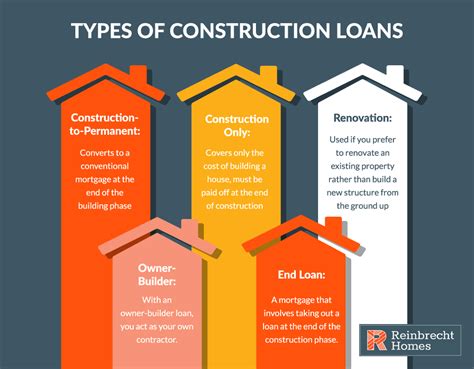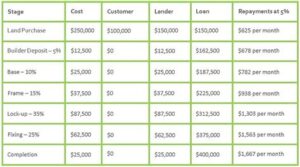
In today’s dynamic financial landscape, understanding construction loan rates is crucial for both builders and homeowners looking to finance new projects. With numerous factors influencing these rates, the landscape can be complex and overwhelming.
This article delves into the top considerations that dictate current construction loan rates, offering insights into how market conditions, borrower credit scores, and loan-to-value ratios come into play. By navigating these key influences, borrowers can better position themselves for favorable loan terms and successful negotiations.
Join us as we explore the essential elements that not only shape the cost of financing construction projects but also empower you to make informed decisions in your borrowing journey.
Understanding The Top Factors That Affect Construction Loan Rates
When exploring the Top Factors that influence construction loan rates, it is essential to consider various interconnected elements that can impact financing decisions for your project. Here are the key factors to keep in mind:
- Economic Environment: The broader economic landscape significantly affects interest rates, with inflation, unemployment rates, and overall economic growth influencing lenders’ decisions.
- Demand for Construction Financing: Increased demand in the housing market can lead to higher construction loan rates, as lenders adjust their offerings based on borrower competition.
- Construction Industry Trends: Changes in the construction industry, such as labor costs and material prices, can shape lenders’ perceptions of risk and, consequently, the rates they charge.
- Loan Type and Terms: Different types of construction loans (such as fixed-rate or variable-rate loans) and their associated terms (like repayment duration) can also impact the overall cost of borrowing.
- Regulatory Guidelines: Government regulations and policies can affect lending practices and interest rates, emphasizing the importance of staying informed about any legal changes.
By understanding and analyzing these Top Factors, you can be better equipped to navigate the construction loan landscape and secure the most favorable rates for your project.
How Market Conditions Influence Construction Loan Interest Rates
Market conditions play a significant role in determining the interest rates for construction loans. The relationship between overall economic stability and interest rates is one of the top factors that borrowers need to understand when considering a construction loan. Various elements within the economy influence these rates, including but not limited to inflation rates, employment statistics, and the Federal Reserve’s monetary policy.
When the economy is booming, demand for construction tends to rise, which can lead to elevated interest rates as lenders adjust to increased competition for funds. Conversely, during economic downturns, interest rates might decrease to stimulate borrowing, making it an attractive time for construction loans.
Additionally, global economic events can impact local rates. For instance, geopolitical instability may lead to market fluctuations that affect the cost of borrowing. As a result, staying informed about both national and international economic trends is crucial for anyone looking to secure a construction loan.
Housing market trends, such as home prices and inventory levels, can also influence construction loan rates. A tight housing market can drive up construction loan demand and subsequently lead to higher interest rates.
The Role Of Borrower Credit Scores In Loan Rate Determination
The borrower’s credit score plays a crucial role in determining the interest rates offered on construction loans. Lenders use credit scores as an indicator of the borrower’s creditworthiness and risk profile. A higher credit score typically signals to lenders that the borrower is more likely to repay the loan, leading to more favorable terms.
Generally, borrowers with credit scores above 700 are viewed as low-risk and may qualify for the best rates available. In contrast, those with scores below 600 are often classified as high-risk borrowers, which can result in significantly higher interest rates or even loan denial.
Furthermore, lenders assess additional factors alongside credit scores, such as income stability, existing debt levels, and overall financial history. However, the credit score remains one of the top factors that influence loan rate determination. A strong credit score not only enables borrowers to secure a lower interest rate but can also improve their chances of being approved for larger loan amounts.

To enhance your credit score and increase your chances of obtaining the best possible loan rates, consider the following strategies:
- Pay bills on time to avoid late payments.
- Reduce outstanding debt to improve your credit utilization ratio.
- Regularly check your credit report for errors and dispute inaccuracies.
- Avoid opening new credit accounts before applying for a construction loan.
Maintaining a healthy credit score is vital for borrowers looking to secure favorable construction loan rates. Understanding how your credit score impacts your financial options can empower you to make more informed decisions and potentially save thousands over the life of the loan.
Impact Of Loan-to-Value Ratios On Construction Loan Costs
One of the top factors influencing construction loan costs is the loan-to-value (LTV) ratio. This ratio compares the amount of the loan to the appraised value of the property being financed. A lower LTV ratio generally indicates less risk for lenders, as it suggests that the borrower has more equity in the property. Conversely, a higher LTV ratio can increase the perceived risk, thereby impacting interest rates and terms offered by lenders.
For instance, if a borrower is seeking a loan of $300,000 on a property with an appraised value of $400,000, the LTV ratio would be 75%. In many cases, lenders prefer an LTV ratio below 80%, as this threshold often signifies a balanced risk-reward scenario. If the LTV exceeds this, borrowers may face higher interest rates or additional requirements to mitigate risk.
Additionally, it’s essential to understand that different lenders may have varying thresholds for acceptable LTV ratios. Some may offer more favorable terms for borrowers with lower LTV ratios, while others may implement stricter requirements. Therefore, potential borrowers should shop around and compare offers to find the most competitive rates.
Overall, being aware of how the LTV ratio affects construction loan costs allows borrowers to make informed decisions. By maintaining a lower LTV through a larger down payment or finding a property that appraises for a higher value, borrowers can potentially secure better financing terms, making it a critical consideration when exploring the top factors affecting construction loans.

Navigating The Top Factors For Better Loan Rate Negotiation
Navigating the landscape of construction loans can be daunting, but understanding the top factors influencing loan rates can empower you to negotiate more effectively. Here are some strategies to help you secure better loan rates:
- Research the Market: Stay informed about current construction loan rates and market trends. Knowledge of fluctuations in interest rates will give you leverage during negotiations.
- Improve Your Credit Score: As highlighted in previous sections, a higher credit score can lead to better loan terms. Take steps to boost your credit score before applying for a construction loan.
- Highlight Your Financial Stability: Demonstrating a solid financial background, including income stability and savings, can make lenders more willing to negotiate favorable terms.
- Compare Lenders: Don’t settle for the first offer. Approach multiple lenders and compare their rates and terms. Use this competition to negotiate better deals.
- Consider the Loan-to-Value Ratio: Presenting a strong loan-to-value ratio can significantly affect negotiations. A lower LTV ratio may result in more favorable loan terms.
- Be Ready to Walk Away: Establish your budget and be willing to walk away if a lender cannot meet your needs. This mindset can often encourage lenders to offer better rates.
By keeping these points in mind and focusing on the top factors that influence construction loan rates, you can enhance your negotiation skills and potentially secure better financing options for your construction projects.

Frequently Asked Questions
What are construction loan rates?
Construction loan rates are the interest rates charged on loans specifically for financing the construction of new buildings or renovation of existing structures.
What factors influence current construction loan rates?
Several factors influence construction loan rates, including economic conditions, the borrower’s creditworthiness, the loan-to-value ratio, prevailing interest rates, and the project location.
How does the borrower’s credit score affect construction loan rates?
A higher credit score generally leads to lower construction loan rates, as lenders view borrowers with higher credit scores as less risky and more likely to repay their loans.
Why is the loan-to-value ratio important in determining loan rates?
The loan-to-value (LTV) ratio measures the loan amount against the appraised value of the property. A lower LTV ratio suggests less risk for the lender, often resulting in more favorable interest rates.
How do economic conditions affect construction loan rates?
Economic conditions such as inflation, unemployment rates, and overall economic growth can influence construction loan rates, as lenders adjust rates based on the perceived risk in the economy.
Are construction loan rates typically fixed or variable?
Construction loan rates can be either fixed or variable. Fixed rates remain the same throughout the term of the loan, while variable rates can fluctuate based on market conditions.
What should borrowers consider before applying for a construction loan?
Borrowers should consider their credit history, the nature and location of the construction project, the anticipated costs, and how changes in interest rates could impact their overall budget and repayment capacity.

Leave a Reply